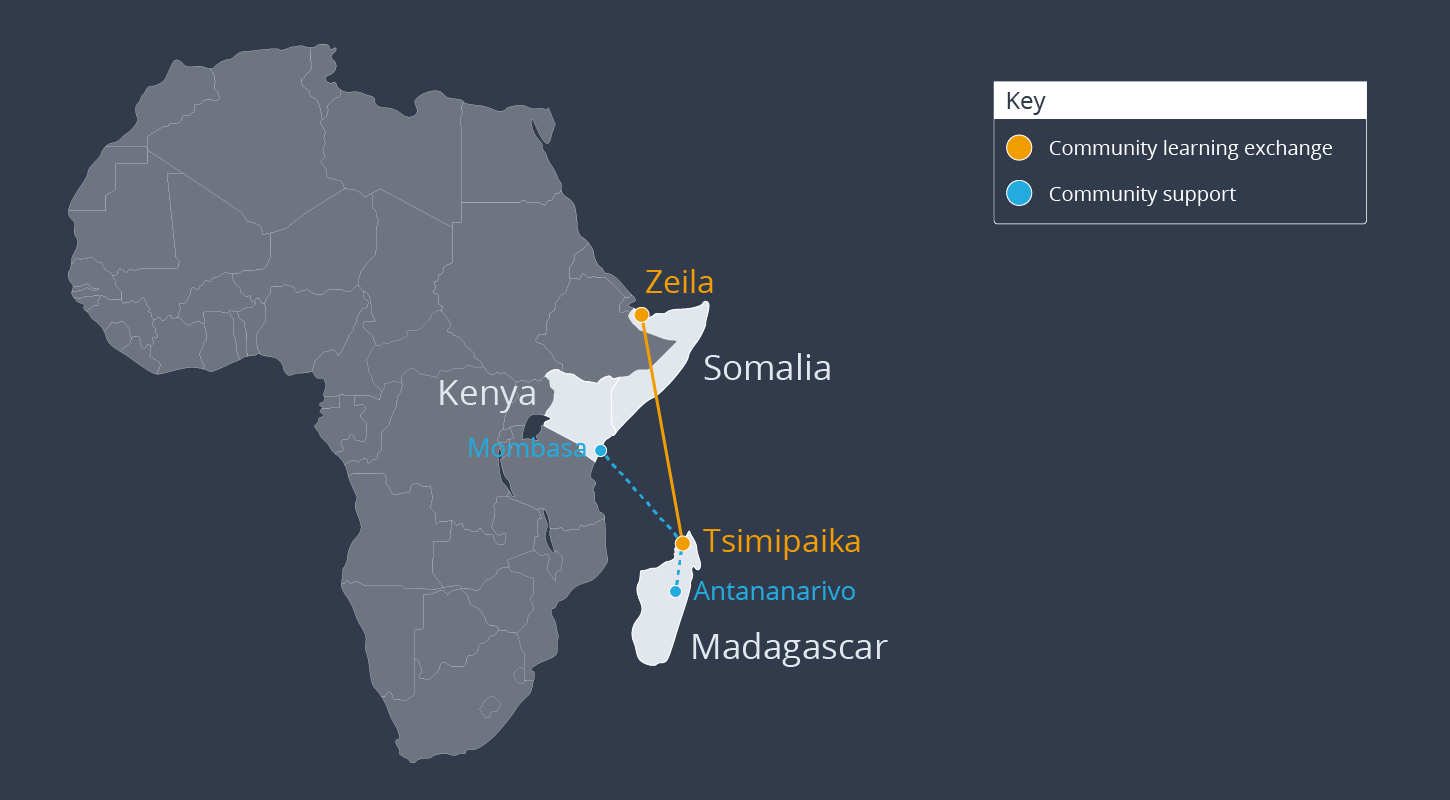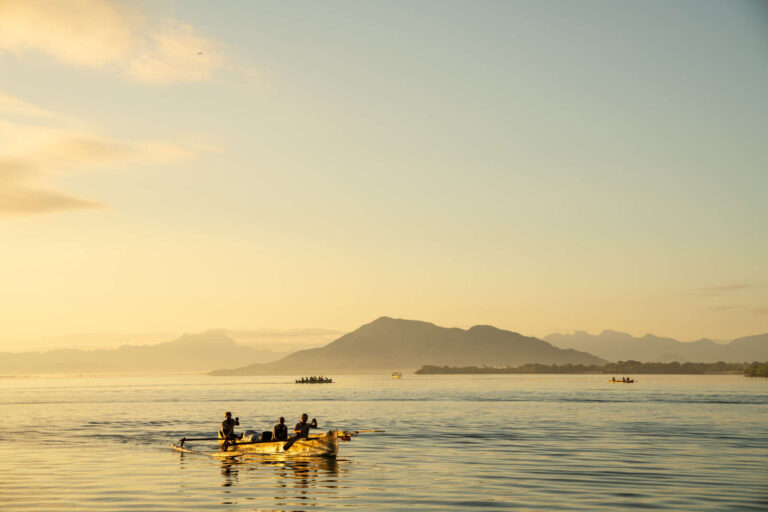For two decades, we have been carrying out the simple yet transformative work of bringing together fishers and starting conversations that catalyse locally led marine conservation efforts.
Fisher learning exchanges are instrumental in helping coastal communities learn from each other about how to adapt and apply existing marine and fisheries management initiatives. We know that seeing is believing, and that showing people what’s possible inspires community-led change.
Our latest landmark learning exchange brought Somali fishers and partners working to establish Somaliland’s first marine protected area (MPA) around biodiversity-rich waters and mangroves in Zeila district, which borders Djibouti, to visit communities in northwest Madagascar.
Our colleagues travelled from Kenya and different areas of Madagascar to accompany the fishers, plus representatives from Secure Fisheries and Candlelight supporting the Zeila community’s MPA plans and working in Somaliland, Ethiopia, Somalia and Djibouti, to visit four community-led mangrove and fisheries projects in Tsimipaika Bay.

“Each place we visited had a unique project, seeming to indicate that they are locally driven and depend on local context, which could be the secret to their successes in managing natural resources.”
Omar Dahir Hussein, a fisher from Zeila
Hussein and other Somali fishers found the visit invaluable for hearing directly from community members about tailoring fisheries management plans and marine conservation models to suit their specific needs and make them work for people and nature alike.
He couldn’t wait to share the practical tips he received from Malagasy peers about how to replenish Zeila’s mangroves, which are crucial for protecting livelihoods, faster and more easily with people back home to revive and encourage reforestation efforts.
Despite the Somali coastline being the longest in Africa, a lack of fisheries governance means many foreign and industrial vessels fish with impunity. These illegal, unreported and unregulated fisheries threaten coastal community livelihoods and marine ecosystems in one of the world’s most food-insecure regions.
Seeing and hearing from different communities about the benefits of temporary fisheries closures provided the Zeila fishers with much food for thought. They learned how they could make the most of their fisheries year-round to provide vital food and income, while increasing their sustainability.
"In Zeila, there aren’t yet any management measures like there are here. This is what they wanted to see, so we showed them what we do and what works well here, and I think the message got through. We're very happy that other communities are coming to visit us to learn what we're doing."
Gamal Ahmed Mouhtar Ahmad, President of Nosy Faly’s management association
Fathia Ahmed Ibrahim, who works for Candlelight in Djibouti, said that fisheries closures, a common entry-level community conservation project due to their quick and often encouraging results, are initiatives that she could see people in Zeila adopting.
“I think one of the first initiatives that the fishers in Zeila will be able to replicate back home is the three-month fishing closures in the mangroves. There is no such temporary closure [system] in Somaliland, yet it allows the crabs, fish and shrimp to lay eggs, reproduce and grow further, contributing to the protection of the ecosystem and the crab or fish population.”
Fathia Ahmed Ibrahim, Candlelight, Djibouti
The visitors were impressed by seeing how community members came together to manage their fisheries and local environment. Abokor said that he was most inspired by seeing how different fishers, youth, and women’s associations were united under one locally managed marine area (LMMA) community umbrella in Tsimipaika Bay, where the visitors witnessed the government transfer mangrove management rights to communities for 11 LMMAs, covering around 6000 hectares of mangrove and ocean.
“In Zeila, we only have a fishers’ association. There is no youth association, and the women’s association just started this year, so it’s new. I’d like to see fishers, youth, and women groups acting and collaborating in our village and want to implement that.”
Abokor, fisher
During the rights transfer ceremony, a women’s group in Tsimpaika Bay sang about their long but rewarding journey as a community to manage their fisheries better.
Faced with the risk of diminishing catches, in 2018 the communities surrounding Tsimipaika Bay adopted a fisheries management plan to protect their ecosystems and preserve their livelihoods.
Their work on temporary fisheries closures, permanent marine reserves, mangrove conservation, and minimum catch sizes have increased catches of key local species like mackerel. They’ve also established community savings groups, and already replanted more than 1500 hectares of mangroves.
Seeing how people in Tsimipaika earn more from their environment by protecting it encouraged the Zeila team, but hearing from government representative Jean Hervé Bakarizafy at the ceremony how the authorities valued the communities’ work was truly inspiring.
“The state cannot manage natural resources alone. To give communities the motivation and the means to take care of their resources, transferring management to them is essential.”
Jean Hervé Bakarizafy, representative of Government of Madagascar
In response to Bakarizafy’s speech, the Somali guests shared a local proverb with him: You cannot wash your face with one finger; you need all five fingers.
“That is the lesson I am taking away: managing fisheries locally and sustainably is not an easy job that can be done in the blink of an eye - it takes time and requires collaboration.”
Mohamed Mohamud Abdullahi, project manager for Secure Fisheries in Ethiopia
Despite visitors learning first hand how long and hard the road to conservation can be, witnessing how it has paid off for Malagasy communities has only further motivated partners to follow their lead when developing plans for establishing a Zeila community-led marine protected area, and boosted their shared ambition and belief that these plans will come to fruition.
“Now that the Zeila community members have seen how others have been successful, I think that we can work with the fishers to establish LMMAs following the same steps that the communities [in Madagascar] have taken.”
Mohamed Mohamud Abdullahi, project manager for Secure Fisheries in Ethiopia.
Devastating droughts linked to climate change in the Horn of Africa underscore the growing importance of sustainable coastal fisheries for food and livelihoods in the region.
“Given the diverse marine resources, it might be valuable for the communities to explore fisheries management to counter food insecurity and provide a livelihood for their families.”
Mohamed Mohamud Abdullahi, project manager for Secure Fisheries in Ethiopia
We are excited to expand our partnership work in East and Southern Africa to support partners and coastal communities in Somaliland and the wider Horn of Africa to develop their fisheries to protect their marine ecosystems and alleviate hunger and poverty.
“We left the bay of Tsimipaika optimistic that the visit would be impactful after witnessing the unity among the community members as they experienced different cultures and observed the successful projects. We heard the Zeila fishers talking about many lessons they were taking away from the communities they visited. This trip was a great example of how learning exchanges present practical opportunities to support communities to be better stewards of natural resources.”
Clay Obota, Fisheries Officer for Blue Ventures in Kenya
“Exchange visits build trust and motivation on both sides. They're a win-win.”
Zo Andriamahenina, National Technical Advisor for Governance for Blue Ventures in Madagascar
Read more about how community exchanges create learning bridges between fishers across continents.
Read the FAO guide to fisher exchange best practice.
Find out how these experiences support our global aims of creating thriving fishers, and thriving oceans.

